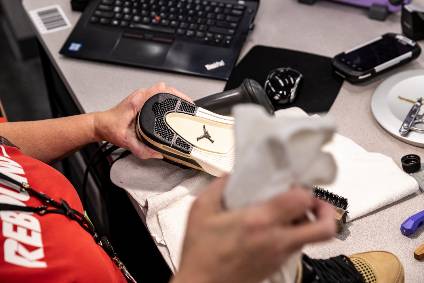
While the sportswear giant did not publicly respond to requests to address the forced labour issue, in its FY22 Impact Report published earlier this week, Nike said it is working with several organisations to clamp down on forced labour in supply chains.
Specifically, Nike said it is aware the employment of foreign migrant workers creates an increased risk of forced labour.
“At Nike, we believe in the Employer Pays Principle – prohibiting workers from paying fees for their employment – which is a critical component of a responsible supply chain and in eliminating forced labour risks in the industry and beyond.”
Nike said along with adopting the Employer Pays Principle, it is also a member of the Leadership Group for Responsible Recruitment (LGRR) – an initiative of the Institute for Human Rights and Business.
“We support them with their mission to drive positive change in the international recruitment industry by advocating that governments and organizations adopt the Employer Pays Principle. We also updated our Code of Conduct and CLS to help drive clarity on our expectations of suppliers and facilities and the types of prohibited fees.”
Nike said it also works to provide resources for suppliers to identify risks in their operations and recruit more responsibly. This includes partnering with global and local experts to provide regional training to suppliers.

US Tariffs are shifting - will you react or anticipate?
Don’t let policy changes catch you off guard. Stay proactive with real-time data and expert analysis.
By GlobalDataIn FY22 Nike worked with the Responsible Labor Initiative (RLI) to deliver a responsible recruitment post-training program to all strategic material suppliers in Taiwan. The program comprised a series of practical coaching and consultation sessions between RLI experts and suppliers.
“In the program, the suppliers developed a gap analysis of their own recruitment systems and practices and prioritised key areas of improvement. All suppliers worked to strengthen their systems and practices in recruitment fees and recruitment agent due diligence.
“They were then divided into three smaller working groups based on their other areas of focus: responsible recruitment compliance monitoring, labour contract and job advertisement. These groups work directly with an RLI expert weekly in root cause identification, improvement plan development and implementation deployment. The suppliers also gather monthly for learnings and best practice sharing with their top management, and suppliers are coached to conduct self-evaluation of the improvements, so they have the capability to continue their improvement journey.”
Beyond this, Nike says since FY19 it has used a CUMULUS Forced Labor Screen – a due diligence tool to help identify risks related to the recruitment of foreign migrant workers
In FY22 it expanded the use of the tool to all Tier 1 finished goods and strategic Tier 2 materials suppliers hiring foreign migrant workers in countries and regions in its extended supply chain that the company identified at heightened risk for forced labour. These include Malaysia, Thailand, Taiwan, Japan, Jordan, Egypt, South Korea, Mexico, Argentina, and Brazil.
It also added a new feature for verification of recruitment fee payment and reimbursement to foreign migrant workers.
“This process helps us identify risks and opportunities, with focus on more impactful risks such as recruitment fees, to further support suppliers and their recruiting agents in implementing best practices. It also helps us continue to evaluate and monitor the effectiveness of the programs put in place to address and minimise risks related to forced labour.”
Nike says, with the importance of industry collaboration in mind, it is working with multi-stakeholder and external organizations such as the FLA and the ILO’s Better Work program to address labor risks in its supply chain.
Additionally, in FY21, it began a Strategic Partnership Program with Issara Institute with the kickoff of Issara Worker Voice program at all Tier 1 finished goods and Tier 2 material suppliers operating in Thailand that employ foreign migrant workers.
This work focuses on empowering suppliers to strengthen human resources systems to address issues and build trust with workers while focusing on issues impacting foreign migrant workers.
In FY22, 243 calls were received through Issara Worker Voice’s multilingual hotline channel. These calls focus on areas such as working conditions, employer–employee communications and relations, and labour recruitment. Issara works with the suppliers in sharing workers’ concerns anonymously, providing support and follow-up throughout each supplier’s improvement progress.
“In FY22, NIKE expanded our partnership with Issara Institute by launching their Foreign Migrant Workers assessment survey in a factory in Thailand. This survey assesses gaps in the foreign migrant worker recruitment process, implementation of the Employer Pays Principle and working conditions. In FY23, we plan to expand the survey to other Thailand facilities employing foreign migrant workers.”



